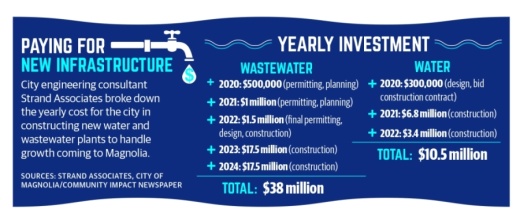Kelly Hajek, a representative with Strand Associates—engineering consultants for the city—presented proposals to build a wastewater treatment plant near Mill Creek, estimated to cost $38 million, and a water plant near Spur 149, estimated to cost $10.5 million.
Hajek said both plants need to be operational in early 2022 to deal with the coming growth.
“It really just depends on how quickly the houses hit the ground,” she said.
Strand Associates recommended the new water plant be fully operational before the city reaches 2,615 new connections, meaning the number of new users to the city’s water plant; the city is already at 2,455 committed connections from new developments.
Strand Associates said the city anticipates 880 new connections for both water and sewer services in the next year.
City Administrator Don Doering said the city still has some capacity at its plants; he did not provide the number of connections.
“So far we are in good shape,” he said. “But it is going to be a short period of time where we are obviously going to need more capacity.”
As the projects need to start soon, James Gilley of US Capital Advisors spoke to the council on funding options.
“The quickest way is to employ market financing,” he said.
This option involves issuing certificates of obligation to fund projects, Gilley said, and paying it off by 2047.
The other financing options presented included rural development loans from the government or the Texas Water Development Board, which would include more regulations and higher costs, and could slow the process, Gilley said.
Although expansion of the city’s infrastructure is key to bringing development, Gilley said there is some risk involved.
“If the development doesn’t happen as planned, then that could be a problem,” he said. “Somebody has got to take the risk to build the infrastructure, and then the development will come.”
Gilley said through impact fees, a fee charged to new water or wastewater users, he believes the city can make up the $48.5 million.
“With a water and sewer connection it should be $4,800 per connection [in impact fees],” he said. “[However,] the fewer connections you have, the more the city’s finances are going to be stretched.”
Although council did not approve financing plans March 10, the council did authorize Strand Associates to proceed with planning the projects, assuming certificates of obligation are used as funding.
“We are not prepared to pursue financing, [as] we don’t have hard numbers yet,” Mayor Todd Kana said.




